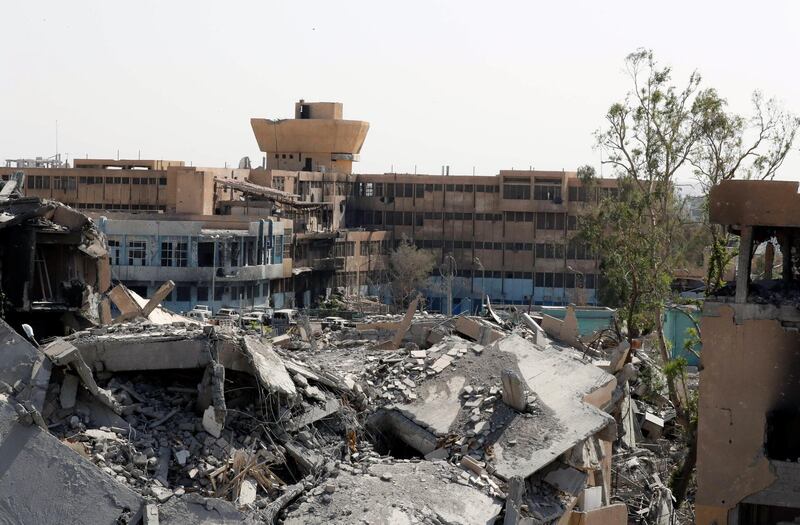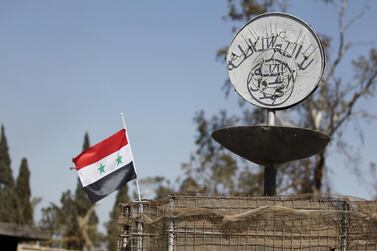As US-backed forces move to take the last remaining areas from ISIS, the militant group that once exacted brutal control across swathes of Syria and Iraq, The National has asked two activists and journalists to speak about their experience of living under the group's dark rule. These accounts are published alongside analysis and news looking back at the years-long war against ISIS and to what the future holds for a group defeated on the battlefield but far from wiped out.
You wake up every single morning with two eyes. You learn to live with that your entire life, and this is normal. But who defined this state as "normal" while labelling all else as "abnormal"?
I have not woken up with two eyes for several years. I have learned to wake up with more than 10 eyes. When you come from a city such as Raqqa or Deir Ezzor, you need all the eyes that exist.
This was my situation on the morning of Friday July 21, 2014, when my friend Taym Ramadan came up to me to tell me “They’re here”.
I didn’t need more than two words to understand what was happening.
When Taym was out running some errands, he saw some people raising ISIS flags in his city in northern Deir Ezzor and smashing hookahs in front of a coffee shop.
It was shocking because he had assured me the previous night that there were no ISIS members in the city. But, that morning, it became clear that some members of the Free Syrian Army withdrew at dawn and ISIS entered in the morning.
The following day, some ISIS members started roaming the streets in their cars asking people to go to the big mosque in the city. After people had assembled in the mosque, one ISIS leader entered and demanded that residents pledge allegiance to ISIS leader Abu Bakr Al Baghdadi.
This occurred as ISIS patrols detained media activists who were working in the region. Taking advantage of the horror that reigned over the city, ISIS announces through one of its members that anyone working for a media organisation not affiliated with the group would be executed.
A new phase
That same night Taym told me: “I feel that we have entered a new stage of the Syrian revolution. I feel that we are facing a new enemy that surfaced and we have to fight it. I feel torn inside between agony over the upcoming phase and persistence and determination to fight oppression.”
Eventually, we would start to work as anti-ISIS activists despite the threat from the militant group. We needed nothing but to trust each other to survive the most dangerous extremist organisation Taym would go out at night and tag graffiti on walls to express opposition to ISIS. Those tags later became posters. The whole campaign infuriated ISIS members who did not expect any opposition. This frustrated ISIS even more because it came at a time when their propaganda was expanding. We took it upon ourselves to stick a thorn in their propaganda.
We later developed our work, further organised our ranks and started unveiling what life was like inside ISIS-controlled territories. Taym knew a lot about digital security. He knew how to block and conceal personal information which saved our lives in the cities controlled by the terrorist group.
We saved and collected money to purchase a satellite internet device and hid it in Taym’s house so he can send daily pictures and videos about life in the ISIS-controlled cities to members of our activist network who were living outside of Syria. Those were to be shared or archived for later publication.
This work would make anyone anxious. But in Taym’s case, one learns how to befriend anxiousness and there is no way to lose your temper or even to show it when provoked.
Saving the children
Taym had a long-lasting vision. Work for him was not a daily routine but a contribution to his children’s future. He once told me: “I am a father who is worried about the future of his children. I fear their life under ISIS reign, the Al Assad regime or any other dictatorship. For this reason, taking a risk was a must for the sake of the uprising and my children.”
He once spoke to me about how he was worried about the fate of children who were living under ISIS rule.
“I remember one time when ISIS executed a man in the centre of the city. A large number of children gathered to watch. A 10-year-old boy was standing by me. I covered his eyes to keep him from watching the scene but he pushed my hand away. I felt that those children were in danger should ISIS persist. I feared terrorism activities would become customary for children to watch. This awakened the child in me,” he said.
I was in Raqqa during the onset of battles between ISIS and the US-backed Syrian Democratic Forces who were trying to seize control of the city. I was able to cover the battles and send updates, pictures and videos nearly every day. I had even been in direct touch with many newspapers and international sites following their request to cover the war as this was my job.
As though the death surrounding me wasn’t enough, I was informed one day that my mother passed away in Deir Ezzor. I did not have the chance to give her one last kiss or farewell before she was laid to rest. I didn’t whisper in her ear how regretful I am that I had left her. I could not explain to her that it was out of my control. I didn’t whisper how much I love her. I felt I became a little child again, a child lost amid a crowded marketplace who had to go back home.
However, at that moment, there was no way to reach home in Deir Ezzor and there was no hope to see my mother upon my return – no hope to cling on to her abaya and cry and tell her about my story. But I had to hang in there. There are people out there who have not lost their mothers yet and I had to stop this from happening to them.
War of conquest
Taym and I were not very happy about the progress made by the SDF, even though it meant that ISIS was being defeated. The aim of the SDF campaign was always to seize control of territory and never once was it to liberate us. Wars of liberation do not claim the lives of thousands of civilians who are awaiting salvation. Innocent civilians were targeted by the SDF and the international coalition’s missiles and bombs which more often targeted them than ISIS.
Deir Ezzor and Raqqa may be freed from ISIS but Taym and I do not consider going back at the time being. A black-flagged terrorist organisation may have gone but another one with yellow flags is still there, the Syrian regime is still there, Iranian and Iraqi militias are still there, Russia is still there. The land is ours but it is occupied.
The famous writer Khaled Hosni once wrote: “The land does not have mercy on the invaders, all of them will leave.” We will be there when they leave and our land is the most merciful on us.
Sarmad Al Jilane is a founding member of the activist-run Raqqa is Being Slaughtered Silently media outlet. He left in early 2017 and joined Sound and Picture – another activist-run media outlet that covers the areas of Raqqa and Deir Ezzor.






